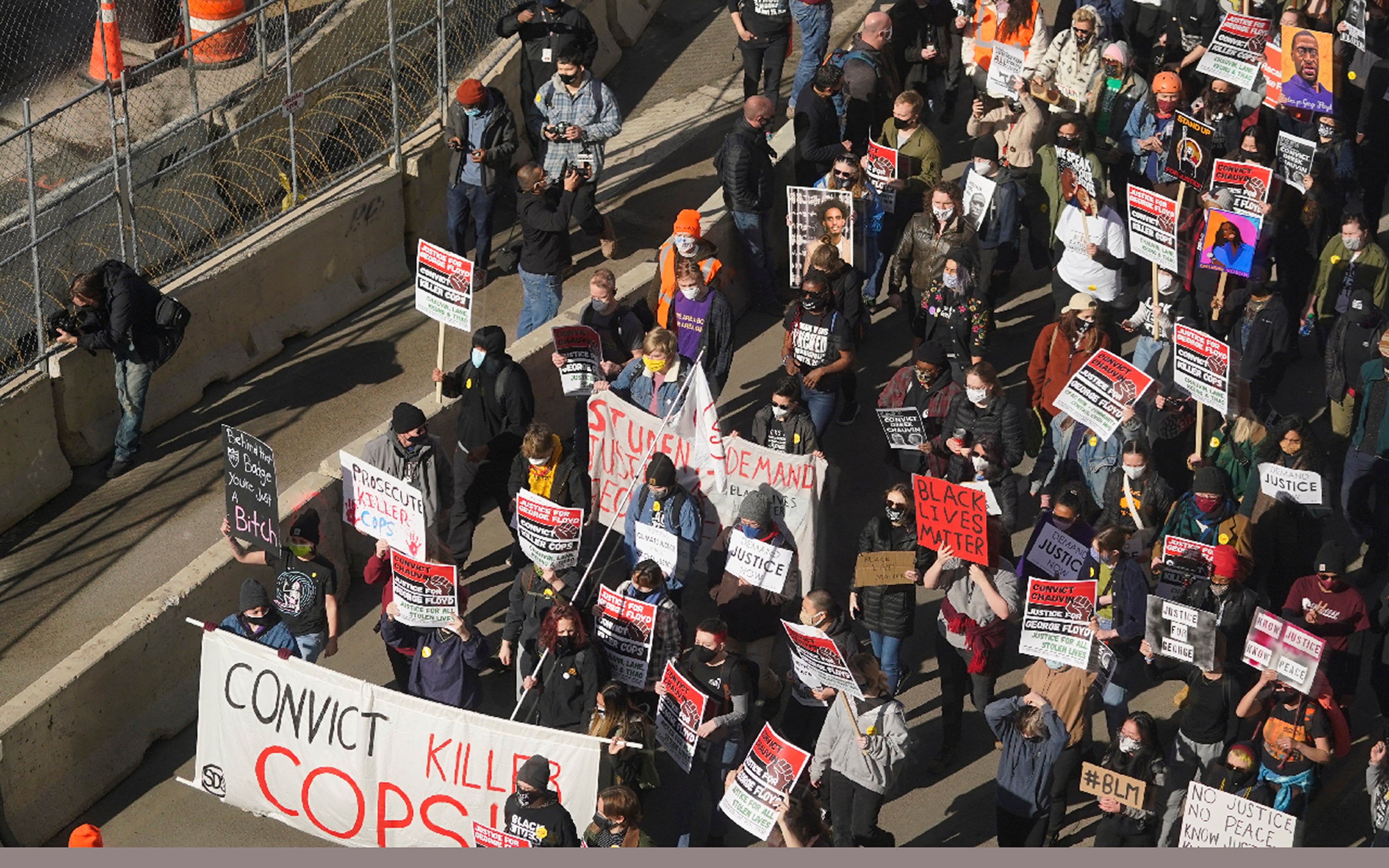Minneapolis moves to disband police force as George Floyd trial begins
If it passes, it would be a major victory for activists, who have called for defunding or replacing the city’s police force

Your support helps us to tell the story
From reproductive rights to climate change to Big Tech, The Independent is on the ground when the story is developing. Whether it's investigating the financials of Elon Musk's pro-Trump PAC or producing our latest documentary, 'The A Word', which shines a light on the American women fighting for reproductive rights, we know how important it is to parse out the facts from the messaging.
At such a critical moment in US history, we need reporters on the ground. Your donation allows us to keep sending journalists to speak to both sides of the story.
The Independent is trusted by Americans across the entire political spectrum. And unlike many other quality news outlets, we choose not to lock Americans out of our reporting and analysis with paywalls. We believe quality journalism should be available to everyone, paid for by those who can afford it.
Your support makes all the difference.The Minneapolis City Council on Friday voted to advance a proposal that would replace the Minneapolis Police Department with a new public safety department, following massive unrest across the city after the death of George Floyd while in the custody of the MPD.
The proposal, which passed 11-2, next heads to the city’s Charter Commission, which oversees the city’s charter, akin to a constitution. Then, it will return to the council, which could put the measure before voters in November.
It would put the city’s police force under the control of the council, rather than the mayor, as it is now.
If it’s successful, the change could mark a major victory for anti-police brutality activists, many of whom called for deep reform or outright replacement of the Minneapolis police force following Mr Floyd’s death.
“Under today’s charter, our police department continues to use force to injure and to kill residents with alarming regularity. That force is disproportionately targeted at Black people and Indigenous people and people of colour,” council member Stever Fletcher said during the vote. “We cannot accept these outcomes as a cost of doing business to keep some of us safe.”
City council members have been trying since June to propose a replacement to the MPD, amid broader reform efforts across the city.
“Our commitment is to do what’s necessary to keep every single member of our community safe and to tell the truth: that the Minneapolis police are not doing that,” Minneapolis council president Lisa Bender said at the time, in a speech that attracted headlines from around the world. “Our commitment is to end policing as we know it and to recreate systems of public safety that actually keep us safe.”
But the Charter Commission, an unelected body, comprised of mostly white people, effectively rejected the idea, saying proposed language was vague and more time was needed to consider it, keeping it from reaching the ballot.
The Mayor’s office, which has tangled with the council on the future of policing in the city, has said in the past it has concerns about the “clarity of command” under such a reform, but would review a final proposal once it’s ready.
Council member Linea Palmisano voted against the proposal on Friday and made a similar argument.
“Why would we want to introduce further blurred accountability, inefficiencies and personality problems into the police department?” she said, according to the Minnesota Reformer, which reported the vote. “Of course we need to transform the delivery of our public safety so that it is responsive to the needs and concerns of every city resident … But we should not delude ourselves into thinking this will actually accomplish these goals.”
The MPD and the state Department of Human Rights agreed last year on other changes: banning chokeholds and neck restraints, such as the one used on Mr Floyd before he died; requiring fellow officers to intervene if they witnessed their colleagues using excessive force; and limiting the use of crowd control weapons without special approval.
The city council also cut about $8 million from the mayor’s proposed police budget and diverted it to a new mental health response unit and investing more in violence prevention programmes.
But for the tens of thousands of Minnesotans who took to the streets the summer after Mr Floyd’s death, many of these reforms haven’t been enough. Not a single officer was disciplined for misconduct following the mass protests, even though MPD personnel left more than a dozen people with severe brain injuries.
The news comes as the council also considers a civil settlement, likely worth millions, with Mr Floyd’s family, and prosecutors try Derek Chauvin, the former Minneapolis police officer charged with murdering Mr Floyd.


Join our commenting forum
Join thought-provoking conversations, follow other Independent readers and see their replies
Comments